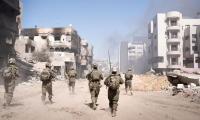RAWALPINDI: Director General Inter-Services Public Relations (ISPR) Maj-Gen Babar Iftikhar on Thursday said the fifth-generation warfare was a major challenge for Pakistan currently.
In an interview, he told ‘Global Village Space’ that Indian propaganda was hitting Pakistan in the diplomatic domain, in the information domain, the military engagements at the Line of Control (LoC), in the economic domain, financially and in lawfare and lobbying regarding the FATF.
He said that was a major challenge, especially what was happening on the social media. He said the best way to handle that challenge was transparency; the best way to handle that was not to leave any information voids, the best way to handle that was passing on credible information, and that was exactly what they were trying to do there.
To a question, the army spokesman said India was making attempts to sabotage the China-Pakistan Economic Corridor (CPEC) project. He said Indians knew CPEC was a game-changer [project] for the region and it offered connectivity to the whole region, making Pakistan a connectivity hub. Therefore, they started making attempts to sabotage the project. “The kind of threat that the project is facing from the Indians obviously is that they started with the security threats that we are facing. There is a lot of terrorist activity going on around it,” Maj-Gen Babar Iftikhar said, adding that India was not comfortable with CPEC passing through certain territories in Pakistan.
He pointed out that the security threat around the project and different stages of the project has actually been increasing with the passage of time.
The DG ISPR said the Indians were really targeting the international image of Pakistan when they try and target CPEC and there have also been terrorists who are being used to target this project, continuously targeting the Chinese manpower involved.
However, the spokesman for Pakistan Army said the kind of measures that Pakistan had taken, India had not been able to retard the progress of the project. They have not been able to dent it, and it was progressing more every day.
He said Pakistan has raised two divisions for the security of the project and other than that there are about eight to nine regular regiments protecting the Corridor, the project, at various locations from wherever it is passing through. In addition to that, there are paramilitary troops which have also been deployed.
“We have taken every possible measure to keep this project secure, and our Chinese partners are also very satisfied with the kind of security measures that we have taken,” he added. To a question, the DG ISPR said Chief of the Army Staff General Bajwa’s vision as far as military diplomacy goes it has been “we need peace within, and we need peace around us”.
“Pakistan’s military leadership has reached out to the military leadership of the countries in the region and beyond and it has really been received very positively, and we have had a number of advantages from this,” Babar Iftikhar said.
The Army spokesman said the world was taking very seriously the evidence Islamabad had presented in the dossier against New Delhi that India was sponsoring terrorism inside Pakistan.
“The world has taken note of it. The world is talking about it, and despite India’s best efforts, there has been a lot of objective analysis of what’s been said.
“And, I think the objectivity of the debate around this dossier, the contents of the dossier, at the international level is a major plus and we are going to take it forward,” the spokesman said.
Babar Iftikhar said ever since India took August 5, 2019 action, it received a lot of negative, and Pakistan took the issue at different international forums very effectively. “So this was an ongoing thing; they were already receiving a lot of flak on this thing. But when this dossier came out, this was frankly a vindication of what Pakistan had been saying for so long,” the DG ISPR said.
About continuous cease-fire violations (CVFs) at the Line of Control (LoC), the DG ISPR said that India had been doing so to externalise what was happening inside India. He said as Indian Illegally Occupied Jammu and Kashmir is concerned, India has been continuously trying to tag this indigenous freedom struggle with terrorism and the last two years have seen maximum number of CVFs.
He observed that what India was trying to achieve from this ceasefire violations was that they were trying to divert the attention of the world towards Pakistan, and they were trying to claim that whatever was happening inside Indian Illegally Occupied Jammu and Kashmir was because of infiltration.
“It is absolutely propaganda, and the only reason that they are doing it is; one, to externalise their internal issues; second, they understand whether they fire on us or whether we fire back, it’s the Kashmiris who are being hurt on both sides,” he said. He said the international community has to understand that any major disturbance in the balance of power in South-Asia would be a major disaster, not only for the region, but also for the rest of the world, so this balance of power must be maintained at every level and the more it is disturbed, the more it gets lopsided, the more dangerous it becomes.
“I think the differential of defence spending between India and Pakistan is almost 1:9, but we are absolutely prepared for what we have in front of us, and we are aware of what they are acquiring,” he said.
To a question about increasing strategic ties between US and India, he said threat perception in Pakistan’s case is very clear as India is aiming at equipping itself with high-tech material. “This is what these agreements are offering, whether it is weapon systems or whether it is classified information,” the DG ISPR said.
The major general said the kind of links found on the social media of some negative press going for Pakistan, 90% of that is coming from Indian websites, so there are so many examples.
To a question about situation on western border, he said as far as the western border was concerned, Pakistan’s “aim has been to ensure better management of this border. So after we were through with the operations that we were doing, right now there is not a single inch of land along the western border which is not manned by Pakistan soldiers,” he said adding that Pakistan have fenced about 83% of the Pak-Afghan border, the remaining work would be completed.
As far as the Pakistan-Iran border is concerned, 30% of it has been fenced so far and it is believed that by Dec 2021, it would also be done. He said as revealed in dossier, there has been a massive effort by the Indian side to create some kind of disturbance inside Pakistan, especially in the border regions and they are also trying to target the fencing over there, the way we are trying to fence the border.
“We keep sharing whatever little incidents happen along Pak Afghan border in our frequent press releases. So, I think it has brought down the incidents to a major extent.” About future of peace in Afghanistan, the DG ISPR said as far as Pakistan's role in the Afghan peace process was concerned, it was that of a facilitator; Pakistan had done everything that it could to facilitate the peace process.
“We have tried to facilitate this to every extent that we could, and everybody has acknowledged that, the Afghan government, the US government, they all acknowledged that Pakistan has played the most positive role in trying to bring them on the table, try to facilitate the talks and to take this peace process to a logical conclusion, so that is our role in it, and that is what we will continue doing,” he said.
Responding to a question about military engagement with the Chinese, military engagements with the Gulf region, military engagements with the United State, Russia, the DG ISPR said Pakistan has gone to explore new avenues on this account and it really helped bring Pakistan’s international image to a new level.
“So the outreach whether it is for training, whether it is for different other exchanges at the strategic level, and whether it is for defence equipment, buying and selling, I think it is in all the avenues, it has been very positively received, and brought us a lot of dividends on that account.,” Major General Babar said.
On the issue of COVID-19, he said that Pakistan Army had been part of every effort that had been undertaken by the government, by the people of Pakistan to control it. He also acknowledged the role of the front line health workers, who fought through it, and who were again on the front lines.
Khawar Manika's counsel continued his arguments on Wednesday in a petition filed by Imran Khan and Bushra Bibi
IHC reserved judgment on the petition against registration of cases against former interior minister Sheikh Rashid on...
Saudi woman who was reportedly kidnapped from Islamabad’s residential Sector F-8 in mysterious circumstances, has...
Pakistan Navy warship rescued 8 Iranian fishermen after their boat caught fire in the open sea
SC dismissed appeal against SHC order that turned down application of partner seeking extension of time to furnish...
Executive board of International Monetary Fund will meet on April 29 to discuss the approval of $1.1 billion funding...







